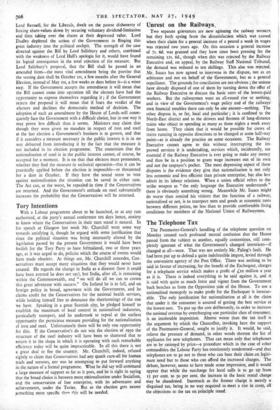The Telephone Tax
The Postmaster-General's handling of the telephone question on Monday created such profound mental confusion that the House passed from the subject to another, equally contentious, still com- pletely ignorant of what the Government's changed intentions—if changed at all—were. That was not entirely Mr. Paling's fault. He had been put up to defend a quite indefensible impost, levied through the convenient agency of the Post Office. There was nothing to he said in favour of increasing, for the benefit of the Exchequer, charges for a telephone service which makes a profit of Lzo million a year as it is. There is indeed everything to be said against it, and it is said with quite as much force and vigour from the Government back benches as from the Opposition side of the House. To use a nationalised monopoly to make profit for the Exchequer is inexcus- able. The only justification for nationalisation at all is the claim that under it the consumer is assured of getting the best service at the lowest cost. To put up the cost deliberately, in order to increase the national revenue by overcharging one particular class of consumer, is an intolerable imposition. Almost worse than the tax itself is the argument by which the Chancellor, invoking here the support of the Postmaster-General, sought to justify it. It would, he said, relieve the pressure of demand, in other words shorten the list of applicants for new telephones. That can mean only that telephones are to be rationed by price—a procedure which in the case of other commodities the Labour Party has consistently condemned—and that telephones are to go not to those who can base their claim on legiti- mate need but to those who can afford the increased charges. The debate, however, seems to have made some impression, and it would appear that while the surcharge for local calls is to go up from 15 per cent. to 5o per cent. the increase in the basic rental charge may be abandoned. Inasmuch as the former charge is merely a disguised tax, being in no way required to meet a rise in costs, all the objections to the tax on principle stand.






































 Previous page
Previous page